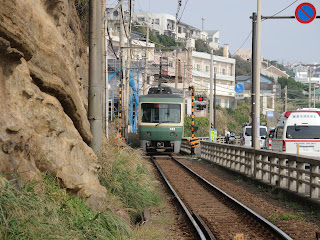 |
| The Eno-Den |
Almost a couple of weeks ago, I think, "Uta Kon"(うたコン)had Goro Noguchi(野口五郎)on for what I think NHK said was his very first appearance on the music-variety show in its current incarnation. And he made the most of his time by performing his most successful hit.
That would be "Amai Seikatsu", his 14th single from October 1974. Now, at first glance, I would have translated that title into "A Sweet Life" but reading Michio Yamagami's(山上路夫)lyrics, it is much more accurate to have it mean "A Naive Life". Noguchi sings about a guy trying to pick up the pieces after a relationship goes down the tubes. The impression is that there is a huge hole in his apartment where his mate used to be.
Now that I remember, I realize that Noguchi showed up during that tribute show to composer Kyohei Tsutsumi(筒美京平)who indeed came up with the melancholy melody. And man, looking up at that video above, the 70s aidoru really had his supporters. I wouldn't have blamed him if he had suddenly stopped singing to chastise the screamers.
Anyways, the song hit No. 1 on Oricon and came close to hitting the million barrier in sales; according to J-Wiki, it was about 950,000 records sold. "Amai Seikatsu" also won composer Tsutsumi a prize at the Japan Record Awards that year, and earned Noguchi his 3rd appearance at the Kohaku Utagassen which apparently cemented his position as one of the Shin-Gosanke(新御三家...The New Big Three) along with fellow singers Hiromi Go(郷ひろみ)and Hideki Saijo(西城秀樹). In fact, his appearance at the Kohaku marked the first time that all three aidoru made their presence known at the NHK special. By the end of the year, the song was the 70th-ranked single of 1974 and even grew higher a year later by ranking in at No. 34.
Recorded by Hiromi Iwasaki around 1976-77.
ReplyDeletehttps://www.youtube.com/watch?v=KLb_iKH_ocU
Thanks, Jim. Wonderful voice as always. Interesting arrangement in the intro.
Delete